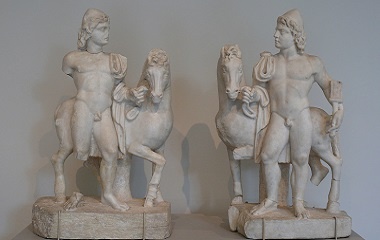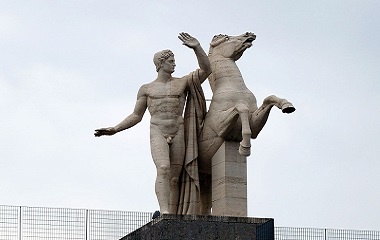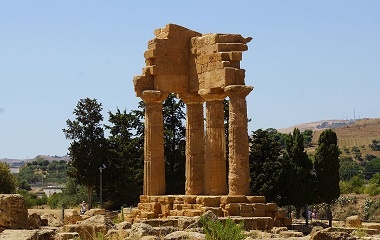- Pronunciation: Car-ster, Pol-luks
- Origin: Mortals in Greek and Roman Mythology
- Role: Friendship, sports and protecting the home
- Parents: Pollux: Zeus and Leda. Castor: Tyndareus and Leda
- Wives: Phoebe and Hilaeira
- Symbols: A pair of snakes, dokana symbol
Who are Castor and Pollux?
Castor and Pollux, also called the Dioscuri, meaning youths of Zeus, were semi-divine twins and patrons of the Roman knights. They also protected humans in danger during war times and at sea. Castor and Pollux were closely linked to sports and horses. Castor was a brilliant horse tamer and Pollux, a skilled boxer. In reference to their father or stepfather, the twins were also known as the Tyndaridae.
Origin
The twins were supposedly born from an egg after Zeus, disguised as a swan seduced Leda. The one twin, Pollux, was immortal, but his brother Castor was mortal, since he had another father. Castor’s father was a human male named Tyndareus. Tyndareus had slept with Leda on the same night as Zeus. According to Pindar, an ancient Greek poet, the twins could swap their immortality when they switched between Hades and Mount Olympus. The twins had a cult following too, dating back to the mid-6th century BC.
Legends and Stories
The twins were excellent huntsmen and formed part of the party that killed the vicious monster, the Calydonian boar. The animal had been sent as punishment by the goddess Artemis, because the king had not honored her. The boar was, however, struck first by an arrow from a powerful woman, Atalanta, which caused a ruckus amongst the men. Many of the hunting party turned on each other over the spoils, ironically extending the goddess’ punishment of the people. The twins also took part in the Argonaut expedition. Pollux had to make use of his superior boxing skills in the adventure with Jason, to beat King Amycus of Bebryces, their prize boxer.
The Leucippides
The twins wanted to marry two women, Hilaeira and Phoebe, but both of the ladies were promised in marriage to the twin’s cousins already. Castor and Pollux nonetheless kidnapped the two women and took them to Sparta, where each bore their husband a son. This caused great strife in the family and resulted in the start of a feud. Their two cousins, Idas and Lynceus, later went to Sparta to visit their uncle. Helen was left to manage the household, as their uncle was away. The twins saw the chance to take revenge on their cousins, who had stolen their cattle, and left to go and steal Idas and Lynceus’ herd. The cousins left shortly after them, leaving Paris, prince of Troy, alone with Helen. Paris took advantage of everybody’s absence and kidnapped the exquisite Helen, thereby starting the Trojan War.
The cousins came across Castor and Pollux, attempting to free their cattle and a battle ensued. Idas killed Castor with his spear and Lynceus was killed by Pollux. Idas was stopped at the last second from killing Pollux by Zeus. Zeus sent a deadly thunderbolt which killed Idas and saved his son. Zeus gave Pollux the choice to save his brother, by giving away half of his most prized possession, his immortality, and Pollux accepted. He then spent half his time in Hades and half on Mount Olympus, as his twin did conversely.
Helen’s Abduction
Theseus, the king of Athens, was in search of a suitable wife. He tried unsuccessfully to pursue an amazon queen, Antiope, and granddaughters of Zeus, Phaedra, and Ariadne.
He didn’t give up on his quest though and next sought out an even more valued prize; Helen of Troy. He abducted her and took her to Attica. Castor and Pollux went to rescue their sister, invaded the king’s land and managed to retrieve her. The twins took Theseus’ mother as revenge and even put the king’s rival on the throne. Aethra, Theseus’ mother, became Helen’s servant, as further punishment for their sister’s kidnapping.
Family
The twins were conceived on the same night but by different fathers. Castor’s father was Tyndareus and Pollux’s father, Zeus. Their mother was Leda, a queen of Sparta. Their sisters were Helen of Troy and Clytemnestra.
Appearance
In Homer’s Iliad, Trojan priest, Dares Phrygius, described the twins as well-built with blond hair and big eyes. In paintings, or sculpture, the twins can frequently be recognized by the skull caps they wear, fragments of the egg they hatched out of. When they appeared at sea, to rescue those in danger, they were said to appear as St. Elmo’s fire, a glowing white or green light on the top of a tall object. When sailors saw the phenomenon, they believed the twins had come to their aid. In art, the twins were frequently depicted on their horses, carrying spears.
Worship
They were worshiped in Rome and Greece, where many temples venerated them. In 495 BC, after victory in battle, the Temple of Castor and Pollux was constructed in Rome. The legend of the battle states the twins led the army and were responsible for its victory. The twins were honored in Rome thereafter and feature on many of their ancient coins.
A dual kingship was a tradition in ancient Sparta, where the land was ruled by the kings of two royal families and each king shared equal authority. The Spartans saw the twins as a valued representation of the dual kingship concept. When one king went to war, the other would remain at home with one of the twins. The ceremony or rite called theoxenia was often linked to the twins too. The rite encompassed the Greek concept of demonstrating hospitality to a stranger. Often the stranger would be a deity in disguise, who would then reward them.
Modern Influence
Gelasius I, a 5th-century pope purported that, even with the advent of Christianity, the cult of Castor and Pollux continued. The twins even featured in 4th century AD pottery with the twelve apostles.
The names Castor and Pollux have been used in many television and film productions, including an opera, in the movie the Hunger Games, in books by Percy Jackson and in the TV series Orphan Black, where male clones are called Castor and their female equivalents, Leda.










